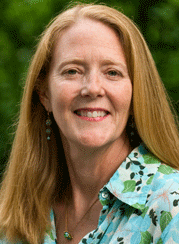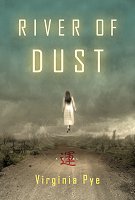 Richmond’s own Virginia Pye is the author of River of Dust, to be released on May 14 by Unbridled Books and selected as an Indie Pick for May 2013. Maya Payne Smart interviews her for a glimpse into the discussions JRW will have with Virginia at this month’s Writing Show and our Annual Conference in October.
Richmond’s own Virginia Pye is the author of River of Dust, to be released on May 14 by Unbridled Books and selected as an Indie Pick for May 2013. Maya Payne Smart interviews her for a glimpse into the discussions JRW will have with Virginia at this month’s Writing Show and our Annual Conference in October.
How did your debut novel arrive on the windswept plains of northwestern China in 1910? Despite the foreign terrain, in what ways were you writing what you know?
My father was born and raised in China as the son of Congregational missionaries in the early twentieth century. I grew up in a household decorated in part with Chinese objects and old, brown-tinged photographs of my grandparents. I have never been to China, but I have an impressionistic sense of the place. Also, I read my grandfather’s journals which document the eerie beauty of that region and some of the customs of the people there. I did some research, but I also relied a lot on my imagination. Apparently, I had a stored up sense of what China felt like at that earlier time.
For years, you approached your writing with great discipline and now you have six manuscripts and many stories and poems to show for it. How did you sustain such motivation over the years and largely on your own? What’s your daily writing routine? How does your short fiction experience inform your novel writing?
I have wanted to write books since I was ten. I scribbled in journals for years and then in high school wrote poetry and short stories. I had no idea what I was doing. In college I was privileged to study with Annie Dillard and I began to understand what is truly involved in writing books.
I think there’s a big difference between writing for oneself and learning to write for an audience. I say “learning to write” because I don’t always think it comes naturally. A person can be a great stylist or have significant ideas, but that doesn’t make them a storyteller who conveys meaning through character, setting and plot.
But back to the question of motivation: early on, I got it into my head that I wanted to write books and the more I persisted at doing that, the less I was able to turn back. After you write two novels, you might as well write three. Three, then four, etc. It takes a lot of practice—at least it has for me—but I did get better at it over time.
Also, as you become more serious as a writer as you learn that not all rejections are the same. In addition to the novels, I was always writing short stories and sending them out to literary magazines. I tended to aim high with those publications and was turned down a lot. But the rejection letters became more and more personal with time. I started to send stories to particular editors at the journals and that helped.
It also helps to go to conferences where you meet people in publishing. You have a face to go with the name. They’re just people—granted, very smart and hard-working people—but basically good, book nerds, just like the writers they turn down or accept.
I find writing short fiction incredibly difficult. To write a perfect, or even not-nearly-perfect, short story is every bit as miraculous as writing a novel of decent caliber. It takes a huge amount of discipline. Carrying any piece of writing to a finished, edited, carefully-wrought level informs every other piece of writing a person will do. It’s all about persistence, diligence, reading well and learning from past mistakes.
 Your debut novel will be released May 14. What surprised you most about the path to publication after your book was picked up? What’s your best advice to aspiring authors about navigating the publishing process?
Your debut novel will be released May 14. What surprised you most about the path to publication after your book was picked up? What’s your best advice to aspiring authors about navigating the publishing process?
I’m so excited that River of Dust has been chosen as an Indie Next Pick for May! I’m thrilled. I worked with my editor at Unbridled Books on several drafts after he accepted the manuscript. Since then, I’ve been learning by the minute from wonderful professionals about book marketing and publicity. There’s a lot to learn, but luckily, in my case, I am being taught be terrific people.
My main advice to other writers both before and after publication is to remain grateful. Writing a book is a gift. Getting it published is a gift. Getting to share it with readers is an enormous gift. And I’m grateful to the incredibly knowledgeable and wise people who help make that happen.
You served as chair of JRW for several years. What do you value most about this particular community of writers? What significant role did the group–or individual members of it–play in your journey to authorship?
JRW is a terrific writers’ organization. I served as chair or co-chair for three years, was on the board for seven, and am still on the advisory board. I’m very proud of those years of service. I love how JRW holds up aloft a big umbrella for many types of writers to come under. We’re renowned in publishing circles for being super friendly and hospitable.
Thanks to the many JRW programs that have featured literary agents, editors, publicists and book doctors, we’re pretty savvy about publishing. We’ve learned to navigate social media—or, at least, have had opportunities to learn how to do that. And, as we’ve learned, we’ve had each other for good company. We understand what it means when one of us gets asked for pages from an agent. And we’re uniformly excited for one another when good news finally arrives. I’ve hardly ever known a more generous, encouraging and supportive group. I think we’re very lucky here in Richmond.
Is there anything I haven’t asked that you would like to share with readers?
I’d like to encourage fellow aspiring writers (because some part of me will always align myself with that camp) to persist, but not to do so with blinders on. It’s good to have your own vision for your work. Good to have a strong sense of your own purpose. But at a crucial point, you need to be willing to take advice and follow it. I tore up a manuscript that I’d worked on for five years to create River of Dust. I received brilliant help to do that. And I’m grateful that I did. Had I remained stubbornly stuck in my previous vision of the work, I might not have a published book now. So listen to your own voice, but when the time is right, do what a good editor tells you to do. They know what they’re talking about.
 Maya Payne Smart is a professional writer who has contributed hundreds of articles to newspapers, magazines and websites, including Black Enterprise and CNNMoney.com. She also helps writers master the business side of the craft through coaching and local courses. She received a bachelor’s degree in Social Studies from Harvard University and a master’s degree in editorial journalism from the Medill School of Journalism at Northwestern University. Maya has served on the board of the Society of American Business Editors and was the 2012 chair of James River Writers.
Maya Payne Smart is a professional writer who has contributed hundreds of articles to newspapers, magazines and websites, including Black Enterprise and CNNMoney.com. She also helps writers master the business side of the craft through coaching and local courses. She received a bachelor’s degree in Social Studies from Harvard University and a master’s degree in editorial journalism from the Medill School of Journalism at Northwestern University. Maya has served on the board of the Society of American Business Editors and was the 2012 chair of James River Writers.

